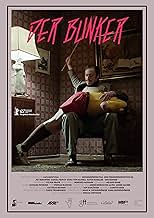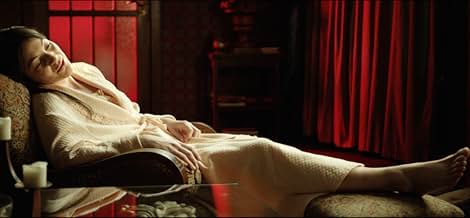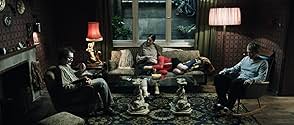IMDb RATING
6.1/10
2.2K
YOUR RATING
A young student seeks quiet and solitude to focus on an important work but ends up as the teacher of a peculiar boy who is home-schooled by his parents in an isolated bunker mansion. THE BUN... Read allA young student seeks quiet and solitude to focus on an important work but ends up as the teacher of a peculiar boy who is home-schooled by his parents in an isolated bunker mansion. THE BUNKER is a dark, twisted, and funny tale about childhood, growing up and education.A young student seeks quiet and solitude to focus on an important work but ends up as the teacher of a peculiar boy who is home-schooled by his parents in an isolated bunker mansion. THE BUNKER is a dark, twisted, and funny tale about childhood, growing up and education.
- Awards
- 7 wins & 8 nominations total
- Director
- Writer
- All cast & crew
- Production, box office & more at IMDbPro
Storyline
Did you know
Featured review
There are several messages one is able to take away from "The Bunker", an uproarious and quite clever black comedy from German director Nikias Chryssos: one is that education needs rigour, but that too much rigour can be dangerous; another is that families can eventually become suffocating and that progression is essential to development. Its lasting message seems to be that, ultimately, everybody moves at their own pace in life and that this isn't a bad thing, so long as you eventually get to where you want to go.
The film also seems to be an exploration of the twisted relationship between failure and success, a relationship which affects all facets of human life and a relationship we can all relate to: rewards for hard work and punishment, or repercussions, for not ascertaining a particular grade. Buried in there somewhere as well seems to be the notion that there is a particular pleasure derived from education, but an acute pain from scholarly failure.
The elusiveness of the film makes itself evident almost immediately - the rather harshly juxtaposed imagery of a well-clad man in the snowy wilderness, evidently a little lost but close to his goal, stumbling around some woodland to opening credits put to us in a wacky font and in bright primary colours. Known only as The Student (Pit Bukowski), he is a scientist looking for an isolated retreat advertised on the internet so that he may work in solitude on some important study to do with the Higgs Boson Particle. The titular bunker is this solitude, run by two people known only as 'Mother' (Oona von Maydell) and 'Father' (David Scheller) whose son, Franz (Daniel Fripan), lives with them.
But something is amiss, and it stays amiss. His room ends up being, quite literally, a bunker, which acts as an add-on to this quirky property. The advert said there would be a view of a lake, but the room doesn't even possess a window. The Student points out that no light can get in. 'Nor can it get out!' counters Father. Son Franz looks 35, but we are told he is only 8 - has he even left the house before? Researching the actor, Fripan's height is listed as 5"3, which might constitute as some form of dwarfism. Franz's mother and father behave strangely; when Student eats some dinner upon arrival, we note with unease as to how there is a revolver in the background attached to the wall which appears to be pointing at his temple; later on, Mother speaks to a voice which has appeared to manifest itself as a gash in her shin.
Taking its cues from directors such as Bobcat Goldthwait and Michael Haneke, specifically the sense of absurdist humour combined with a sense of complete unease, and from specific films such as "Dogtooth", Chryssos spins a plot to do with Student being torn away from his own work and roped into being Franz's tutor when it becomes evident Franz is failing miserably at the most elementary of things during home-schooling. The home itself does nothing to ease our sense of unease - it is littered with props which, at once, look as if they belong where they are and yet simultaneously appear totally unnatural to their surroundings: the model hand grenade on the mantelpiece; the way the wool bulges out of a sideboard drawer; the lamp stem which doubles up as a pole around which a topless woman appears to dance. In Franz's bedroom, plush toys hang, as if from nooses, above his bed, but they're just mobiles, right?
Chryssos evidently has an eye for both tone and aesthetic. We accept the film is unfolding in some kind of alternate universe, one whereby people do not immediately leave upon encountering a troupe of oddballs. The whole film is peppered with this nightmarish quality, emphasised in how ceilings in some rooms are too low for the characters; in how Chryssos seems to shoot certain scenes with a deliberately large amount of dead space in the corners of living and bedrooms, and in how he seems to position the camera much further away from a subject than it needs to be in order to encompass it.
In looking for parallels or commentary in the film, I did not find very many, although may have missed something entirely. As a piece of mise-en-scene, a bunker is, of course, a refuge from the outside world; a means of saving yourself and your (nuclear) family from an unwanted attack. Is there supposed to be something in German society taking aim at such a thing? Regardless, he seems to want to emphasise the bourgeois nature of Mother; Father and Franz in his peppering of the soundtrack with classical music and the educational rigour they put Franz through - Father even enjoys a politically incorrect joke or two, laughing at them in that way that suggests he's really not supposed to anymore, but I didn't see the film as an attack on the bourgeois or their system. Similarly, I'm unsure if Franz is supposed to represent a repressed demographic or class, and that everything The Student represents is their liberation.
It would be wrong to describe the film as a comedy wherein the laughs come so quickly, you're left to catch your breath, but that doesn't matter; "The Bunker" is something else, something a little more disturbing without being grotesque, although even then it may tread too far in that direction for some. For me, it found a wonderful place between certainty and ambiguity; causing offense and not; between horror and just being mischievous. It's an experience, but an experience I recommend.
The film also seems to be an exploration of the twisted relationship between failure and success, a relationship which affects all facets of human life and a relationship we can all relate to: rewards for hard work and punishment, or repercussions, for not ascertaining a particular grade. Buried in there somewhere as well seems to be the notion that there is a particular pleasure derived from education, but an acute pain from scholarly failure.
The elusiveness of the film makes itself evident almost immediately - the rather harshly juxtaposed imagery of a well-clad man in the snowy wilderness, evidently a little lost but close to his goal, stumbling around some woodland to opening credits put to us in a wacky font and in bright primary colours. Known only as The Student (Pit Bukowski), he is a scientist looking for an isolated retreat advertised on the internet so that he may work in solitude on some important study to do with the Higgs Boson Particle. The titular bunker is this solitude, run by two people known only as 'Mother' (Oona von Maydell) and 'Father' (David Scheller) whose son, Franz (Daniel Fripan), lives with them.
But something is amiss, and it stays amiss. His room ends up being, quite literally, a bunker, which acts as an add-on to this quirky property. The advert said there would be a view of a lake, but the room doesn't even possess a window. The Student points out that no light can get in. 'Nor can it get out!' counters Father. Son Franz looks 35, but we are told he is only 8 - has he even left the house before? Researching the actor, Fripan's height is listed as 5"3, which might constitute as some form of dwarfism. Franz's mother and father behave strangely; when Student eats some dinner upon arrival, we note with unease as to how there is a revolver in the background attached to the wall which appears to be pointing at his temple; later on, Mother speaks to a voice which has appeared to manifest itself as a gash in her shin.
Taking its cues from directors such as Bobcat Goldthwait and Michael Haneke, specifically the sense of absurdist humour combined with a sense of complete unease, and from specific films such as "Dogtooth", Chryssos spins a plot to do with Student being torn away from his own work and roped into being Franz's tutor when it becomes evident Franz is failing miserably at the most elementary of things during home-schooling. The home itself does nothing to ease our sense of unease - it is littered with props which, at once, look as if they belong where they are and yet simultaneously appear totally unnatural to their surroundings: the model hand grenade on the mantelpiece; the way the wool bulges out of a sideboard drawer; the lamp stem which doubles up as a pole around which a topless woman appears to dance. In Franz's bedroom, plush toys hang, as if from nooses, above his bed, but they're just mobiles, right?
Chryssos evidently has an eye for both tone and aesthetic. We accept the film is unfolding in some kind of alternate universe, one whereby people do not immediately leave upon encountering a troupe of oddballs. The whole film is peppered with this nightmarish quality, emphasised in how ceilings in some rooms are too low for the characters; in how Chryssos seems to shoot certain scenes with a deliberately large amount of dead space in the corners of living and bedrooms, and in how he seems to position the camera much further away from a subject than it needs to be in order to encompass it.
In looking for parallels or commentary in the film, I did not find very many, although may have missed something entirely. As a piece of mise-en-scene, a bunker is, of course, a refuge from the outside world; a means of saving yourself and your (nuclear) family from an unwanted attack. Is there supposed to be something in German society taking aim at such a thing? Regardless, he seems to want to emphasise the bourgeois nature of Mother; Father and Franz in his peppering of the soundtrack with classical music and the educational rigour they put Franz through - Father even enjoys a politically incorrect joke or two, laughing at them in that way that suggests he's really not supposed to anymore, but I didn't see the film as an attack on the bourgeois or their system. Similarly, I'm unsure if Franz is supposed to represent a repressed demographic or class, and that everything The Student represents is their liberation.
It would be wrong to describe the film as a comedy wherein the laughs come so quickly, you're left to catch your breath, but that doesn't matter; "The Bunker" is something else, something a little more disturbing without being grotesque, although even then it may tread too far in that direction for some. For me, it found a wonderful place between certainty and ambiguity; causing offense and not; between horror and just being mischievous. It's an experience, but an experience I recommend.
- johnnyboyz
- Jun 7, 2020
- Permalink
- How long is The Bunker?Powered by Alexa
Details
- Runtime1 hour 25 minutes
- Color
- Aspect ratio
- 2.39:1
Contribute to this page
Suggest an edit or add missing content






















